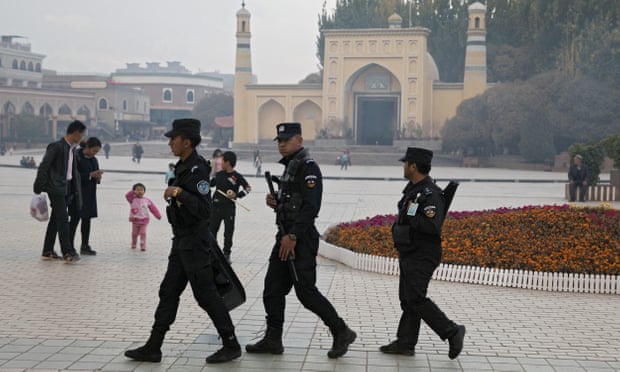China has claimed to have arrested 13,000 “terrorists” in Xinjiang over the last five years, as it launched an aggressive propaganda campaign in defence of its restrictive measures in the far-western region.
Human rights advocates and researchers believe more than 1 million Muslims – mostly Uighurs as well as Kazakhs and other groups – are being systematically imprisoned in internment camps where they are forced to undergo political re-education.
On Monday China’s state council released a white paper on “the fight against terrorism and extremism” and “human rights protection in Xinjiang”, in which Beijing attempted to quantify the campaign.
“Since 2014, Xinjiang has destroyed 1,588 violent and terrorist gangs, arrested 12,995 terrorists, seized 2,052 explosive devices, punished 30,645 people for 4,858 illegal religious activities, and confiscated 345,229 copies of illegal religious material,” the report said.
Over the last few weeks Chinese state media have released a steady stream of reports and slickly produced videos attempting to counter foreign media accounts of mass detentions, surveillance, and suppression of cultural and religious rights in the region.
The flurry of reports appears to be aimed at foreign audiences. CGTN, the international arm of the state broadcaster CCTV, posted a video on Twitter, which is banned in China, titled “Are Uighurs being tortured in China?” In it, a Global Times reporter calls western media reports “nonsense” and concludes that “for some western media, a strong and unified China is the last thing they want to see”.a video follows a Uighur woman in Kashgar at a so-called vocational centre. There are images of shared dormitory rooms with pictures on the wall, neatly folded blankets and courts for basketball and volleyball.
China’s accounts contrast sharply with satellite imagery that shows prison-like facilities surrounded by barbed wire and watchtowers, and testimonies by former and current residents, as well as ex-detainees of the camps.
James Leibold, an associate professor at La Trobe University focusing on ethnic relations, said: “It’s about competing imagery and competing narrative, and if you can saturate the marketplace with your narrative and your images it can be accepted as truth. They’ve really gone into overdrive.”
Chinese officials appear to be following a set script, with two officials suggesting recently that the camp system could one day be phased out. Officials continue to say foreign diplomats and journalists are welcome to Xinjiang, but foreign media continue to be surveilled and blocked when they attempt to report in the region.
Activists said Monday’s white paper was another hollow attempt to justify repressive measures. “Ordinary people should not be labelled as terrorists or extremists and forced to be sent to the camps for re-education. That is an act of brainwashing and what an authoritarian regime would do to its citizens,” said Patrick Poon, a China researcher for Amnesty International.
Others pointed out that while China was able to release such specific figures for its campaign, officials continued to claim they did not know the total number of people sent to internment camps because of the number of “students” entering and “graduating” from them.
“The way they are obsessed with detailing and trying to provide empirical evidence to support their case, but refuse to disclose how many people might be detained … that struck me as deeply ironic,” Leibold said.
We made a choice…
… and we want to tell you about it. We made a choice which means our journalism now reaches record numbers around the world and more than a million people have supported our reporting. We continue to face financial challenges but, unlike many news organisations, we have chosen not to put up a paywall. We want our journalism to remain accessible to all, regardless of where they live or what they can afford.
This is The Guardian’s model for open, independent journalism: available for everyone, funded by our readers. We depend on contributions from our readers. Will you support our choice?
Readers’ support powers our work, safeguarding our essential editorial independence. This means the responsibility of protecting independent journalism is shared, enabling us all to feel empowered to bring about real change in the world. Your support gives Guardian journalists the time, space and freedom to report with tenacity and rigour, to shed light where others won’t. It emboldens us to challenge authority and question the status quo. And by keeping all of our journalism free and open to all, we can foster inclusivity, diversity, make space for debate, inspire conversation – so more people have access to accurate information with integrity at its heart.
Guardian journalism is rooted in facts with a progressive perspective on the world. We are editorially independent, meaning we set our own agenda. Our journalism is free from commercial bias and not influenced by billionaire owners, politicians or shareholders. No one steers our opinion. At a time when there are so few sources of information you can really trust, this is vital as it enables us to give a voice to those less heard, challenge the powerful and hold them to account. Your support means we can keep investigating and exploring the critical issues of our time.
Our model allows people to support us in a way that works for them. Every time a reader like you makes a contribution to The Guardian, no matter how big or small, it goes directly into funding our journalism. But we need to build on this support for the years ahead.
